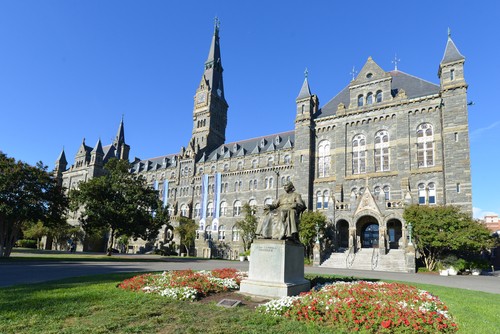-
Tips for becoming a good boxer - November 6, 2020
-
7 expert tips for making your hens night a memorable one - November 6, 2020
-
5 reasons to host your Christmas party on a cruise boat - November 6, 2020
-
What to do when you’re charged with a crime - November 6, 2020
-
Should you get one or multiple dogs? Here’s all you need to know - November 3, 2020
-
A Guide: How to Build Your Very Own Magic Mirror - February 14, 2019
-
Our Top Inspirational Baseball Stars - November 24, 2018
-
Five Tech Tools That Will Help You Turn Your Blog into a Business - November 24, 2018
-
How to Indulge on Vacation without Expanding Your Waist - November 9, 2018
-
5 Strategies for Businesses to Appeal to Today’s Increasingly Mobile-Crazed Customers - November 9, 2018
Georgetown University Plans to Address History of Slavery & Engage Descendants
Georgetown University will give preference in admissions to the descendants of slaves owned by the Maryland Jesuits as part of its effort to atone for profiting from the sale of enslaved people.
Advertisement
“We will give descendants the same consideration we give members of the Georgetown community in the admissions process,”DeGioia wrote in his letter to the university community”.
The New York Times reports that the historic college has a complex history with slavery.
Get news delivered to your inbox every day.
The school also plans to issue an official apology for its participation in the salve trade, create memorials for the people it sold, and establish the Institute for the Study of Slavery and Its Legacies, among other recommendations made by the Working Group.
DeGioia is keeping his word, it seems, on his promise to “make amends” for his school’s role in the American slave trade. Wilder cautioned that the significance of the preferential status in admissions would rest heavily on the degree to which Georgetown invested in outreach to descendants, including identifying them, making sure they are aware of the benefit’s existence, and actively recruiting them to the university.
Only recently did the details of its slavery past come to light, but the university has taken the lead in confronting its past. The sale, which is worth US$3.3 million in today’s dollars, was organized by two Georgetown presidents that were both Jesuits and was used to pay off debts while the slaves were uprooted from the nearby Jesuit plantations in Maryland and shipped to estates in Louisiana.
And because we have names and families and histories and can point directly to people and directly to their descendants today in a way that most institutions can’t. “What we’ve been able to do is develop a road map to open up Georgetown to be a university in new kinds of ways”.
“Whether people know that history or whether people think that history is important, that changes from generation to generation”, Collins said, according to American University radio station WAMU 88.5.
“It goes farther than just about any institution”, he said.
Advertisement
Many historical universities have ties to slavery. It also notes that it was one of the largest mass sales of slaves in American history, but little is known about what happened to those slaves as they went through a battery of further sales over the course of almost the next two decades. The buildings previously had been named for presidents who oversaw the 1838 mass sale. The school will rename its Freedom Hall for Isaac, one of the sold slaves, and Remembrance Hall for Anne Marie Becraft, a black educator.





























